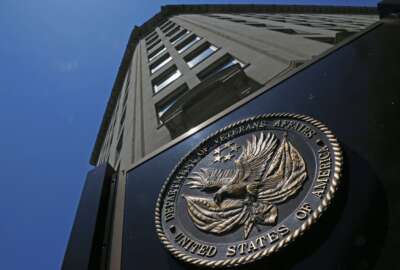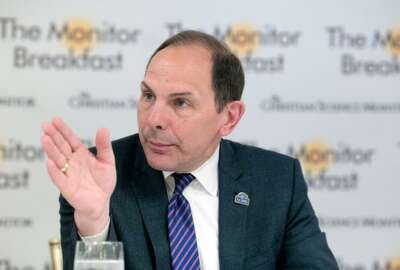
Veterans omnibus hits ‘stumbling block’ in Senate
Senate Veterans Affairs Committee Chairman Johnny Isakson (R-Ga.) said the Veterans First Act, which the department itself is actively supporting, has hit a few...
Veterans Affairs Secretary Bob McDonald has described 2016 as a “make or break year” for the department.
But the outcome largely depends on whether Congress can pass major legislation to change the disability appeals process, access to VA health care and accountability procedures for senior executives at the department.
The Senate Veterans Affairs Committee and the department itself is touting the Veterans First Act as the best case scenario. But the omnibus’ main sponsor said the bill still has a long way to go before it heads to the President’s desk.
“It’s comprehensive and it’s sweeping, and because of that, it’s not going to be the easiest thing in the world to ever pass,” Senate Veterans Affairs Committee Chairman Johnny Isakson (R-Ga.) said at a July 31 discussion at the annual Disabled American Veterans national convention in Atlanta.
Isakson had said his original hope was to have the bill to the President by Memorial Day.
“We’ve hit a couple stumbling blocks in the Senate, so I have not yet gotten it to the floor for a debate,” he added. “I’m trying to get unanimous consent to do that when we get back. … We aren’t to the nobody objecting point yet. But it’s on varying degrees of change they want to make, not on being against the accountability portion.”
House VA Committee Chairman Jeff Miller (R-Fla.) introduced an alternative bill that would significantly change the discipline and appeals process for VA senior executives and the secretary. The VA Accountability First and Appeals Modernization Act addresses the very provision that the VA announced it would no longer use following a recent decision on its constitutionality from the Justice Department.
“Rank and file employees of the system have nothing to fear about accountability,” Isakson said. “The leaders of the organization ought to have everything to fear about accountability … The higher the expectation standards are of the organization, the higher the performance is going to be by the employees up and down the line.”
Isakson said he hopes that either he or Miller can push one of their bills to a full vote, with the goal that the two chairman can come together for conference on both pieces of legislation.
The Senate omnibus has 148 different provisions but doesn’t yet include the VA’s proposal to change the disability appeals process. McDonald said he hoped the Senate would add it as an amendment or pass it as a separate bill.
“The problem is that perfection is never possible,” Isakson said. “We’re at a point where we have 80 percent of what we need to get to improve the veterans administration, give Bob McDonald the clout that he needs.”
Both Isakson and McDonald encouraged audience members to call their congressman in support of the Senate omnibus.
A preview of the Commission report
The House Veterans Affairs Committee is expected to review the VA Commission on Care report, which the group officially released at the end of June, during a hearing in September.
McDonald, who said he detailed his view on the Commission’s recommendations in a report to President Barack Obama, offered a preview.
Twelve of the 18 recommendations are consistent with the goals and proposals McDonald has outlined as MyVA transformation priorities, he said at the DAV convention.
McDonald believes three of the commission’s recommendations need more study, such as the suggestion that VA trim and update its real estate portfolio.
And there’s three recommendations that McDonald and the agency “totally disagree with,” he said.
Specifically, McDonald opposes the commission’s proposed changes to the honorable discharge procedures, as well as its recommendations to shift more VA health care to private providers and add an 11-member governance board.
“It appears to be almost a Trojan horse for privatization,” McDonald said of the commission’s report.
Under the commission’s proposal, veterans would have the option to choose between the VA or a private provider, regardless of whether the Veterans Health Administration could provide that care or not.
McDonald said the suggestion contradicts a concept he’s been trying to build on since he arrived at the department.
“What we’re trying to do right now with the MyVA transformation is actually integrate VA, so that the veteran can go to any employee at the VA and learn about any other part of VA,” he said.
The VA secretary would also lose oversight over the VHA, according to another Commission proposal. The secretary would have a seat on the 11-member governance board, but the group itself would have ultimate control and oversight over the Veterans Health Administration, not the secretary.
“I don’t think that’s necessary,” McDonald said. “The Veterans First Act shows very clearly that Congress can work with the VA on behalf of veterans. I don’t think a surrogate is required. I also question the Department of Justice’s question on the constitutionality of that, because it’s in a sense Congress controlling part of the Executive Branch.”
Copyright © 2025 Federal News Network. All rights reserved. This website is not intended for users located within the European Economic Area.
Nicole Ogrysko is a reporter for Federal News Network focusing on the federal workforce and federal pay and benefits.
Follow @nogryskoWFED
Related Stories






